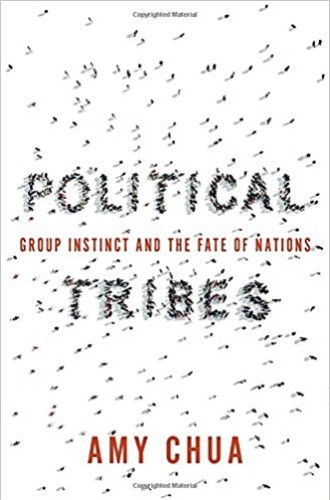Tribalism is natural. It's also destroying us.
Amy Chua considers why we cling to people who look and act like us.
America’s elites have long overlooked a basic fact of human nature: that humans are instinctively tribal. This oversight has led to more than half a century of foreign policy disasters, and it bodes ill for domestic policy as well. That’s a quick summary of Political Tribes, Amy Chua’s highly readable, heavily footnoted extended essay.
By any measure, Chua herself is one of America’s elites. Educated at Harvard and Yale, she has worked for a Wall Street law firm and written several New York Times best sellers. She now teaches at Yale Law School, as does her husband. Her controversial 2011 chart-buster, Battle Hymn of the Tiger Mother, describes how she reared their two daughters, who currently attend Harvard and Yale. When Chua argues that America’s elites just don’t get tribalism, she is talking to her tribe.
Read our latest issue or browse back issues.
Tribalism, she says, begins early: babies as young as three months prefer to look at faces racially similar to their own. And tribalism tends to last a lifetime, often taking dangerous forms. For adults, she writes, “one of the most powerful forms of group identity—and the focal point of political tribalism and violence all over the world today—is ethnicity,” based on the idea of shared blood, history, culture, and language.
According to Chua, America’s elites have downplayed the role of ethnicity in most of America’s recent major conflicts. Dedicated to “the great Enlightenment principles of modernity—liberalism, secularism, rationality, equality, free markets”—they have underestimated “the kind of tribal group identity that human beings crave and have always craved.” Though intellectuals and politicians have a lot to say about individuals and the human race, they too often miss everything in between.
In mid-20th-century Vietnam, for example, America ignored the deep rift between two tribes: the majority Vietnamese people and the minority ethnic Chinese, known as Hoa. Framing the war as a conflict between communism and democracy, America sided with South Vietnamese capitalists—most of whom were Hoa—and opposed the North Vietnamese leader Ho Chi Minh, who, they thought, was alarmingly socialist. The danger, America believed, was that Vietnam would slip into Red China’s orbit.
Ethnic Vietnamese, however, saw things quite differently: to them, Ho was an anti-Chinese freedom fighter. In the 1950s, the Hoa were what Chua calls a “market-dominant minority.” Comprising less than 4 percent of Vietnam’s population, they controlled 80 percent of the nation’s economy. This imbalance alone would have strained relations between the two groups, but tensions between them had been festering, and sometimes flaring, for 2,000 years. “In effect,” Chua writes, “the U.S.-backed regime was asking the South Vietnamese to fight and die—and kill their northern brethren—in order to keep the Chinese rich.”
America lost that war, of course. Similarly, Chua argues, America’s blindness to tribalism led to failures in other countries. American elites did not (and may not yet) fully grasp how rivalries between Sunni and Shi’a Muslims provoked chaos after the United States attacked Iraq in the 1990s; or how, despite well-funded American opposition, Hugo Chávez exploited racial differences to be four times elected president of Venezuela; or how rivalry between Pashtuns and Punjabis has made a hash of American goals in Afghanistan; or how tribal loyalty plus a perceived enemy can turn even decent young people into terrorists. And yet in every case Chua describes, American elites—seeing the world through a Manichaean scrim of freedom versus communism or Islamism—have thought they were fostering democracy.
But democracy is not the solution if gross economic inequality is the problem. “It can be a catastrophic mistake to imagine that through democratic elections, people will suddenly rally around a national identity and overcome their preexisting ethnic, religious, sectarian, and tribal divides,” Chua writes. “On the contrary, in sharply divided societies, democracy often galvanizes group conflict.” When the majority get to vote, they will usually try to drive out the privileged minority—even in America.
Chua, an expert on international business and ethnic conflict, shows clearly and persuasively how tribalism has foiled America’s involvement in other countries. She is somewhat less clear when she turns to America’s tribes—those like-minded, seemingly impermeable bubbles that increasingly define U.S. politics. As she notes, the chasm between rich and poor is not only economic; it is also marked by differing attitudes toward the American dream. America’s poor don’t hate rich people; they want to join them. America’s rich, by contrast, think the American dream has failed. Deep into identity politics, they love public protests against misogyny, racism, homophobia, and Trump.
Political tribes, however, are more complex than haves versus have-nots. Chua writes detailed, often sympathetic descriptions of impoverished white Trump supporters who scorn well-to-do academic liberals in pussy hats. She says considerably less about impoverished people of color who oppose Trump, and nothing at all about billionaire conservatives who buy politicians.
Yet she is nearly correct when she says Americans are “in an unprecedented moment of pervasive tribal anxiety.” (Reminder: the Civil War was no picnic either.) Everyone—rich and poor, minority and white, male and female, gay and straight, Christian, Jew, and Muslim—feels threatened. And if the majority of Americans see “coastal elites” as a market-dominant minority, the result here, as in other countries, is inevitably a populist backlash.
So how can Americans fix this deplorable situation? In her epilogue, Chua offers some anodyne suggestions. Engage with others one on one. Find a national identity that includes us all.
But wait—hasn’t she just been telling us that it’s a mistake to think only in terms of individuals and humanity while ignoring the primal importance of tribes? Can a nation of many tribes ever achieve lasting unity?
Chua deserves high marks for describing America’s problem with tribalism, at home and abroad. Someone else, however, will need to find the solution.







